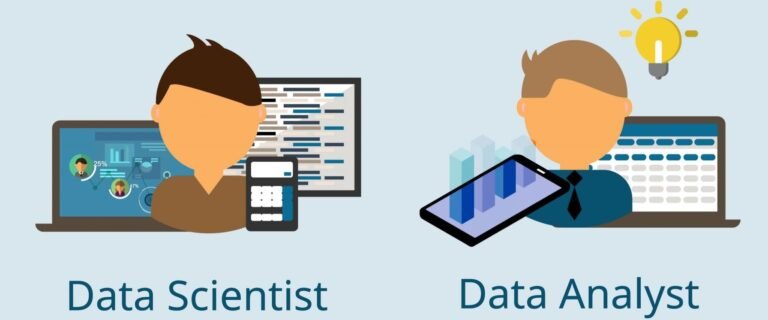
Here we are describe Difference Between Data Science & Data Analytics. Data is increasingly driving business decisions in the modern world. With vast amounts of data being generated from various sources, organizations need efficient ways to derive value and insights from this data. Two popular approaches for working with organizational data are data science and data analytics. But what exactly do these terms mean and what are the key differences between them? This article provides an overview of data science and data analytics, compares them, and highlights when you may want to use one approach over the other.
Data science is a field that uses scientific methods and algorithms to extract knowledge and insights from structured and unstructured data. Data scientists employ techniques from various domains including statistics, computer science, mathematics, and information visualization to analyze data, build predictive models, and interpret outcomes.
Some key objectives of data science projects include:
Data scientists have to be skilled in coding and programming, data mining, machine learning, analytics, math, algorithms, and statistics to perform their multifaceted job roles effectively. They tend to be inquisitive, analytical, and detail-oriented.
Data analytics examines raw data to uncover hidden patterns, market trends, customer preferences and other useful information to help organizations make more informed business decisions. Data analytics techniques include statistical analysis, predictive modeling, dashboards, data reporting and querying to support tactical and strategic planning.
While data science employs advanced analytics and algorithms to derive deep insights, data analytics uses basic to intermediate analytical techniques to enable faster, more accessible analysis for businesses. Common data analytics methodologies include:
Data analysts are typically business-focused and leverage BI tools, such as POWERBI , Tableau , MYSQL and GOOGLE spreadsheet programs rather than advanced coding languages used by data scientists.
Key Differences Between Data Science and Data Analytics
| Data science | Data Analytics |
| Data science solves complex problems to uncover deeper insights | Data analytics extracts insights for business analysis and decision making. |
| Data science builds predictive models for forecasting and classification tasks | Data analytics enables reporting and visualization for business intelligence. |
| Data science can work with all data formats and types—structured, unstructured, big data, small data etc. | Data analytics works primarily with structured data. |
| Data science employs more advanced machine learning algorithms like neural networks, decision trees etc. | Data analytics uses relatively simple analytical techniques. |
| Data scientists have advanced programming, statistical and coding skills to build complex algorithms | Data analysts are proficient in BI tools, SQL, Excel rather than coding languages. |
| Data scientists have a research-oriented role to uncover hidden insights | Data analysts translate insights from data to guide business strategy |
Data science and data analytics offer value in different situations. Data science leverages advanced algorithms to derive deeper data-driven insights while data analytics focuses more on business intelligence, reporting and dashboards for smarter decision making. Companies need to assess their business goals, data infrastructure, analytical capabilities, and team skills to determine which approach yields better return on investment. Using the right methodology allows organizations to increase revenue, reduce costs, identify new opportunities and streamline processes through the power of data.
Q1. Which is better to learn - data analytics or data science?
Ans: Data analytics serves more business analysis needs while data science develops complex models – so they are complementary skills. Learning both creates well-rounded data professionals. Start with data analytics for beginners before progressing to advanced data science.
Q2. Do I need coding skills for a career in data analytics?
Ans: Basic SQL and spreadsheet skills are essential. Proficiency in Python, R and other coding languages expands capabilities but not necessarily required, especially for BI analysts. Data scientists do require programming abilities – so interests and career path matters.
Q3. What kind of salary can I expect as a data analyst or data scientist?
Ans: As per PayScale, average data analyst salary ranges from ₹444K to ₹737K while average data scientist salary ranges from ₹681K to ₹1.4M – higher experience and niche skills impact pay. Both careers remain lucrative and in-demand.